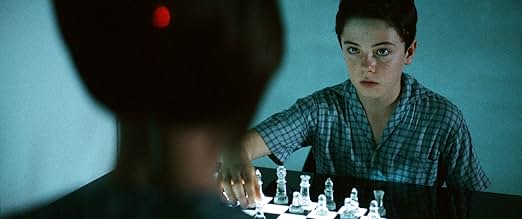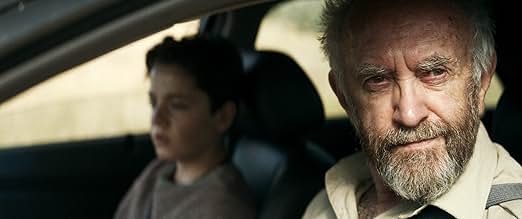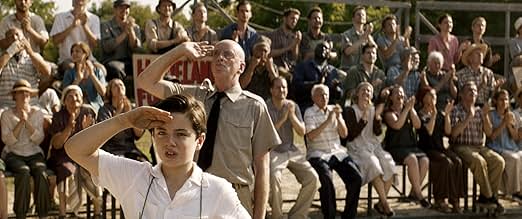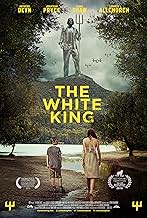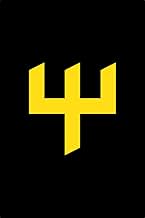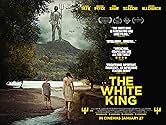IMDb RATING
5.5/10
4.8K
YOUR RATING
A 12-year-old boy rebels after a brutal government labels his father a traitor and imprisons him.A 12-year-old boy rebels after a brutal government labels his father a traitor and imprisons him.A 12-year-old boy rebels after a brutal government labels his father a traitor and imprisons him.
- Awards
- 11 nominations
Olivia Williams
- Sophia
- (voice)
Storyline
Did you know
- TriviaThe film is based on György Dragomán's multiple award winning novel, but the story has been transposed to fictitious near-future dictatorship. Dragomán said this about the film: "In my original novel I wanted to show freedom in a society where freedom should not exist. In their movie Alex and Jörg were brave enough to take my communist childhood tale and adapt it into a modern story, showing us that the threat to freedom is as eternal as our fight for it."
- GoofsIn a close-up shot of Djata as he watches a time-lapse video of a city skyline, viewers see reflections of two lights in his eyes that don't match with reflections that would actually be seen from the video he's watching. In a closer shot a few seconds later viewers do see reflections of the video in his eyes.
Featured review
"They all will have to lose something. If not you are a traitor."
"The White King" takes place in a future society. Has there been a worldwide, destructive war? A deadly epidemic? Or did a world state succeed in shutting down global communication, after which they could conquer all the on high-tech depending countries by using conventional warfare? And after this invasion, did they install a totalitarian regime? You won't get any real answers to these questions. It looks like a hermetically sealed off camp with no luxury and limited basic needs. The regime can be called fascist. Even a sort of Hitler Youth is present. There's militaristic tradition to honor "The Homeland". The food supplies are managed according to strict rules. And apparently, each home is equipped with an intercom system where the daily production and practical information are announced. The Homeland is not a humanitarian society. It's a society where coercion, control and punishment are key words. And this under the eye of strategically placed surveillance cameras.
Djata (Lorenzo Allchurch) grows up in this commune. A continuing atmosphere of threat and oppression stands in the way of a carefree youthful life. Mischiefs are punished severely (with boxing irons). And when he tries to get a football back from some older bullies (probably sons of someone high in the military hierarchy), this turns into a violent fight rather than a kind of capture-the-flag game. In addition, his father is being arrested because of politically incorrect behavior. From then on, their live won't be made easy. Their freedom is restricted and certain necessities are taken away from them.
All this is taking place at the foot of an immense statue which can be compared (In terms of dimensions) with the Christ statue in Rio de Janeiro. But in appearance, it looks like an illustration from old Russia when Marxism ruled. This image appears to be a portrait of the dictator who created this community. However, don't expect further explanation about this. The symbolism used will obviously remind you of other past regimes. One regime stricter and more dictatorial than the other. Despite the attempts to create a teenage atmosphere with Djata searching for a treasure, him visiting his influential grandparents and a short-lived intermezzo in a futuristic-looking building outside the guarded area, the atmosphere in this movie remains gloomy and sinister. This is not a dystopian movie such as "The Hunger Games" or "Divergent" where a heroine overthrows the totalitarian regime. This is a rather cynical film about a not so unthinkable world in which human freedom is non-existent. To think that in our present world there are people who actually live in such humiliating circumstances.
The only actors who looked familiar to me, were Ross Partridge and Jonathan Pryce as Djata's father and grandfather respectively. However, their roles were rather limited (although of significance). It's mainly Lorenzo Allchurch and Agyness Deyn who deliver a brilliant performance. Allchurch's naive look at the society he's living in, is gradually being replaced by a determined attitude. It's not always high-quality, award-winning acting but admirable to play such an important role at such a young age. Deyn's part wasn't necessarily self-evident either. A caring mother who tries to protect her son and who would do everything to get her deported man back. The movie doesn't contain any magical and fascinating images full of special effects. There aren't any battle scenes with rebels trying to overthrow a regime either. The story is generally fairly superficial and vague. Certain scenes were quite unnecessary. Like the confrontation with General Meade. This was solely used to show that it all takes place in a distant future. The end is quite sudden and leaves you behind with tantalizing questions. In terms of mood the film is a success. A sober and compromising atmosphere that feels like a lifelike nightmare. A nightmare that nobody wants to experience in person.
More reviews here : http://bit.ly/2qtGQoc
"The White King" takes place in a future society. Has there been a worldwide, destructive war? A deadly epidemic? Or did a world state succeed in shutting down global communication, after which they could conquer all the on high-tech depending countries by using conventional warfare? And after this invasion, did they install a totalitarian regime? You won't get any real answers to these questions. It looks like a hermetically sealed off camp with no luxury and limited basic needs. The regime can be called fascist. Even a sort of Hitler Youth is present. There's militaristic tradition to honor "The Homeland". The food supplies are managed according to strict rules. And apparently, each home is equipped with an intercom system where the daily production and practical information are announced. The Homeland is not a humanitarian society. It's a society where coercion, control and punishment are key words. And this under the eye of strategically placed surveillance cameras.
Djata (Lorenzo Allchurch) grows up in this commune. A continuing atmosphere of threat and oppression stands in the way of a carefree youthful life. Mischiefs are punished severely (with boxing irons). And when he tries to get a football back from some older bullies (probably sons of someone high in the military hierarchy), this turns into a violent fight rather than a kind of capture-the-flag game. In addition, his father is being arrested because of politically incorrect behavior. From then on, their live won't be made easy. Their freedom is restricted and certain necessities are taken away from them.
All this is taking place at the foot of an immense statue which can be compared (In terms of dimensions) with the Christ statue in Rio de Janeiro. But in appearance, it looks like an illustration from old Russia when Marxism ruled. This image appears to be a portrait of the dictator who created this community. However, don't expect further explanation about this. The symbolism used will obviously remind you of other past regimes. One regime stricter and more dictatorial than the other. Despite the attempts to create a teenage atmosphere with Djata searching for a treasure, him visiting his influential grandparents and a short-lived intermezzo in a futuristic-looking building outside the guarded area, the atmosphere in this movie remains gloomy and sinister. This is not a dystopian movie such as "The Hunger Games" or "Divergent" where a heroine overthrows the totalitarian regime. This is a rather cynical film about a not so unthinkable world in which human freedom is non-existent. To think that in our present world there are people who actually live in such humiliating circumstances.
The only actors who looked familiar to me, were Ross Partridge and Jonathan Pryce as Djata's father and grandfather respectively. However, their roles were rather limited (although of significance). It's mainly Lorenzo Allchurch and Agyness Deyn who deliver a brilliant performance. Allchurch's naive look at the society he's living in, is gradually being replaced by a determined attitude. It's not always high-quality, award-winning acting but admirable to play such an important role at such a young age. Deyn's part wasn't necessarily self-evident either. A caring mother who tries to protect her son and who would do everything to get her deported man back. The movie doesn't contain any magical and fascinating images full of special effects. There aren't any battle scenes with rebels trying to overthrow a regime either. The story is generally fairly superficial and vague. Certain scenes were quite unnecessary. Like the confrontation with General Meade. This was solely used to show that it all takes place in a distant future. The end is quite sudden and leaves you behind with tantalizing questions. In terms of mood the film is a success. A sober and compromising atmosphere that feels like a lifelike nightmare. A nightmare that nobody wants to experience in person.
More reviews here : http://bit.ly/2qtGQoc
- peterp-450-298716
- Jul 3, 2017
- Permalink
- How long is The White King?Powered by Alexa
Details
- Release date
- Countries of origin
- Official sites
- Language
- Also known as
- Белый король
- Filming locations
- Hungary(Filmed Entirely on Location)
- Production companies
- See more company credits at IMDbPro
Box office
- Budget
- £2,000,000 (estimated)
- Gross worldwide
- $14,074
- Runtime1 hour 29 minutes
- Color
- Aspect ratio
- 2.35 : 1
Contribute to this page
Suggest an edit or add missing content








